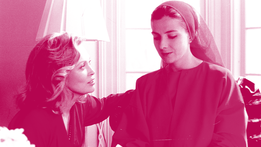weekly column
|
Each week, find a commentary on something connected to verses of Torah or another source of wisdom
|
|
Each week, find a commentary on something connected to verses of Torah or another source of wisdom
|
 The Genesis:3 Project She said, “Here is my maid Bilhah. Consort with her, that she may bear on my knees and that through her I too may have children.” Genesis 30:3 A friend of mine who writes for a national publication asked me what three books I would recommend to get us through the tumultuous times that the current administration has provoked. I chose three: the Book of Psalms, Rainer Maria Rilke’s Book of Hours and Margaret Atwood’s extraordinary novel The Handmaid’s Tale. I hope it is obvious why I chose the psalms. The range of emotions and spiritual dilemmas addressed across 150 devotional poems of human authorship is extraordinary. Whether in distress or joy, the soul resonates with something in this collection. Plus, I am a rabbi, so duh. Rilke is my favorite poet, though I will admit he doesn’t have much competition. I have never been much good at reading poetry, but there is something about this young man’s sense of yearning that has always resonated with me. And this particular collection somehow speaks to me most clearly. But Atwood’s work is probably the best novel I ever read. If you are unfamiliar with it (and did not see the movie or current TV adaptation), you won’t understand the serendipity of my contribution to the magazine and the verse that frames this column. The Handmaid’s Tale posits a dystopian not-too-distant future in which a planet-wide fertility crisis and a fundamentalist Christian take-over of the United States results in an extreme paradigm shift. Suddenly, women’s freedoms are revoked. Those who are unmarried and able to bear children are assigned to households headed by men of wealth and privilege as handmaids. Their main task is to bear children. But because these are Biblical literalists, the sexual congress necessary to produce offspring happens with the handmaid inseminated while leaning against the knees of her infertile mistress. I am not doing a service to the novel by reducing it to this element of the plot, and I am certainly not suggesting that the current administration is plotting anything like the theocratic reboot Atwood imagines. The story is riveting, the examination of what it means to be a woman before, during and after this period of time is breathtaking and the cautions are profound. But it is the prologue and the epilogue that set this book apart. The earliest chapters illustrate credibly how easy it is for the hard-won victories of progressive ideals to be reversed. I talk to lots of people, including those who claim to be part of the “resistance” and those who are enthralled with the changes in public policy, who believe that basic commitments to gender equality and the integration of racial, religious and sexual minorities are irreversible and normative. Atwood dissents. She illustrates not necessarily what will happen, but how easily what might happen could come to pass. The epilogue (spoiler alert) is an optimistic look back at the events of the story from an imagined future vantage point. It is an affirmation that the moral arc of the universe indeed bends toward justice, even if now and then it flops the other way. So is this column just a long-belated book review? Not entirely – though if you haven’t read this book, you should. I find myself thinking about living in a future vantage point from the story of Bilhah, handmaid to Rachel and surrogate mother to Jacob’s sons. Of necessity, because this narrative is in the Torah, it is considered a sacred story. But I look at Bilhah through the filter of The Handmaid’s Tale and understand that whatever honor and blessing our long tradition heaps upon her, she was diminished as a child of God. She had her “rights” (an unknown concept in the Bible), but they were few and paltry compared to her mistress and less still compared to her master. Like the unnamed servants and slaves, resident aliens, religious dissenters, tribal enemies and women of every station, whatever dignity was Bilhah’s was the result of largesse, not inherency. I would like to believe that the fault lies in human beings who were incomplete in their understanding of God’s will, but I am aware that 3500 or more years is a long time for that belief to be widely held. And that’s what makes Margaret Atwood so credible. We do not have the luxury of being sanguine about the gains we have made here in the United States toward full realization of the “self-evident” truths articulated by our founders. The shortcomings we work so hard to overcome are deeply embedded in our individual and collective histories, and it is easy to fall back on familiar tropes – sometimes with malice aforethought and sometimes out of convenience and comfort. Reading psalms, poems and speculative fiction is not the cure for tumultuous times. But to avoid backsliding to a time that our current dissatisfaction imagines as being better than today, it helps to be reminded that the blessings we enjoy are ours by circumstance, not by nature. And that circumstances change.
0 Comments
Leave a Reply. |
Archives
October 2023
Categories |